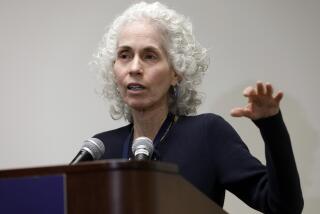3 Hospitals Get OK for Limits on Emergency Care Patients
- Share via
In a move aimed at preventing more South Bay hospitals from closing their doors to patients transported by paramedics, Los Angeles County health officials have agreed to allow three local hospitals to accept public ambulance patients only from their immediate areas.
The agreement will go into effect May 15 at Memorial Hospital of Gardena, Robert F. Kennedy Medical Center in Hawthorne and Daniel Freeman Memorial Hospital in Inglewood. The arrangement could later be amended or canceled if it is found to be impractical, an official with the county’s Department of Health Services said Wednesday.
“It is a trial program, and if it doesn’t work, we’ll stop and go back to the drawing board,” said Barbara Pavey, who supervises paramedic care for the department.
In recent months, all three facilities have said that increasing numbers of patients from outside their areas are overburdening emergency care operations.
Gardena and Freeman, in particular, have said a large number of their emergency patients come from nearby areas served by county-operated Martin Luther King Jr.-Drew Medical Center in Los Angeles. The center is frequently overcrowded, and overflow patients are taken to the two hospitals.
Under the agreement, neither King Medical Center nor Harbor-UCLA Medical Center in Torrance will be allowed to divert paramedic patients from their areas to the three South Bay hospitals.
Figures on how many patients transported by paramedics are treated by the three local hospitals were not immediately available. A Freeman official said that facility treats about 950 such patients each month, but she was unable to say how many of them came from Inglewood and nearby areas.
County health officials have been especially concerned about paramedic service in the South Bay since last spring, when Centinela Hospital Medical Center in Inglewood stopped taking patients transported by paramedics, except obstetric cases. The hospital cited huge financial losses from non-paying emergency cases for its decision.
Then, about five months ago, Memorial Hospital of Gardena, saying it also could not afford to continue to take such cases, filed for permission with state officials to shut its doors to paramedics. The hospital later offered to retain paramedic services if it were allowed to take only Gardena residents.
The county balked at Gardena’s request, but it began talks with the three hospitals to establish areas from which each would draw patients transported by paramedics. County health officials were worried that all the facilities might eventually close their doors to such patients unless a deal could be struck, Pavey said.
“If they leave, (the) impact on county hospitals would be inestimable, just enormous,” she said.
George Rooth, administrator at Memorial Hospital of Gardena, said he was extremely pleased with the agreement. The key to its success, he said, lies with King Medical Center not diverting patients to the three hospitals.
“That was our biggest problem,” Rooth said.
Pavey said county health officials are concerned about the potential effect the agreement could have on King’s patient load. However, she said any effect on the hospital could be lessened because it, in turn, will no longer have to accept patients from the three South Bay hospitals’ areas.
“If it does happen King is overwhelmed . . . we won’t continue the program,” Pavey said. She said King administrators have endorsed the agreement.
David Langness, spokesman for the Hospital Council of Southern California, said he was glad the three hospitals will continue to accept patients transported by paramedics.
However, he predicted such agreements could prevent patients from receiving adequate medical attention if they are taken to an overburdened hospital and forced to wait long periods for treatment.
“It’s distressing,” he said. “We are drawing lines around hospitals.”
The agreement calls for Memorial Hospital of Gardena to essentially treat only those patients picked up by paramedics within Gardena’s city limits. Kennedy will receive patients from Hawthorne, El Segundo, Lawndale and a portion of Lennox.
Freeman will accept patients from Inglewood and areas stretching to Western Avenue on the east, Los Angeles International Airport on the west, Slauson Avenue on the north and Imperial Highway on the south.
More to Read
Sign up for Essential California
The most important California stories and recommendations in your inbox every morning.
You may occasionally receive promotional content from the Los Angeles Times.









